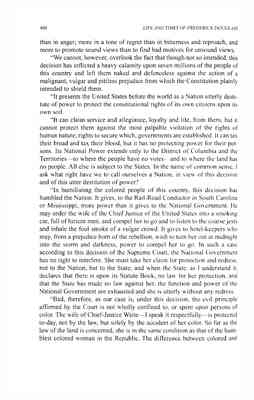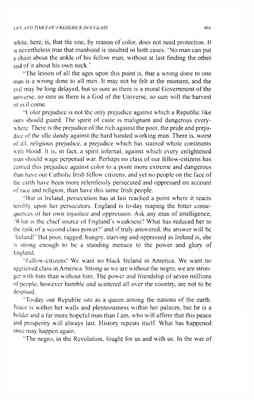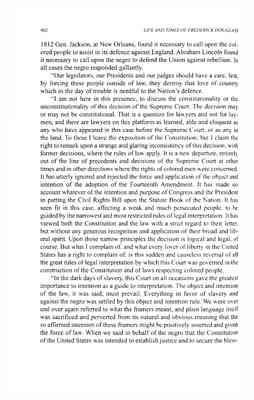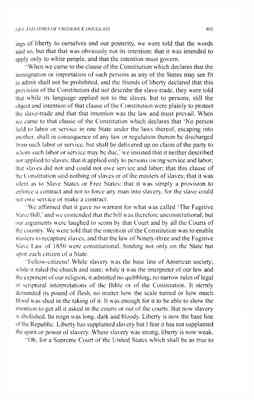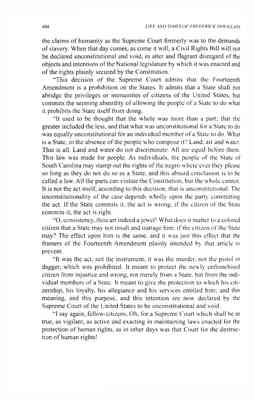Pages
26
400 LIFE AND TIMES OF FREDERICK DOUGLASS
than in anger; more in a tone of regret than in bitterness and reproach, and more to promote sound views than to find bad motives for unsound views.
"We cannot, however, overlook the fact that though not so intended, this decision has inflicted a heavy calamity upon seven millions of the people of this country and left them naked and defenceless against the action of a malignant, vulgar and pitiless prejudice from which the Constitution plainly intended to shield them.
"It presents the United States before the world as a Nation utterly destitute of power to protect the constitutional rights of its own citizens upon its own soil.
"It can claim service and allegiance, loyalty and life, from them, but it cannot protect them against the most palpable violation of the rights of human nature; rights to secure which, governments are established. It can tax their bread and tax their blood, but it has no protecting power for their persons. Its National Power extends only to the District of Columbia and the Territories–to where the people have no votes– and to where the land has no people. All else is subject to the States. In the name of common sense. I ask what right have we to call ourselves a Nation, in view of this decision and of this utter destitution of power?
"In humiliating the colored people of this country, this decision has humbled the Nation. It gives, to the Rail-Road Conductor in South Carolina or Mississippi, more power than it gives to the National Government. He may order the wife of the Chief Justice of the United States into a smoking car, full of hirsute men, and compel her to go and to listen to the coarse jests and inhale the foul smoke of a vulgar crowd. It gives to hotel-keepers who may, from a prejudice born of the rebellion, wish to turn her out at midnight into the storm and darkness, power to compel her to go. In such a case according to this decision of the Supreme Court, the National Government has no right to interfere. She must take her claim for protection and redress, not to the Nation, but to the State; and when the State, as I understand it, declares that there is upon its Statute Book, no law for her protection, and that the State has made no law against her, the function and power of the National Government are exhausted and she is utterly without any redress.
"Bad, therefore, as our case is, under this decision, the evil principle affirmed by the Court is not wholly confined to, or spent upon persons of color. The wife of Chief-Justice Waite – I speak it respectfully – is protected to-day, not by the law, but solely by the accident of her color. So far as the law of the land is concerned, she is in the same condition as that of the humblest colored woman in the Republic. The difference between colored and
27
LIFE AND TIMES OF FREDERICK DOUGLASS 401
white, here, is, that the one, by reason of color, does not need protection. It is nevertheless true that manhood is insulted in both cases. 'No man can put a chain about the ankle of his fellow man, without at last finding the other end of it about his own neck.'
''The lesson of all the ages upon this point is, that a wrong done to one man is a wrong done to all men. It may not be felt at the moment, and the evil may be long delayed, but so sure as there is a moral Government of the universe, so sure as there is a God of the Universe, so sure will the harvest of evil come.
"Color prejudice is not the only prejudice against which a Republic like ours should guard. The spirit of caste is malignant and dangerous everywhere. There is the prejudice of the rich against the poor, the pride and prejudice of the idle dandy against the hard handed working man. There is, worst of all, religious prejudice, a prejudice which has stained whole continents with blood. It is, in fact, a spirit infernal, against which every enlightened man should wage perpetual war. Perhaps no class of our fellow-citizens has carried this prejudice against color to a point more extreme and dangerous than have our Catholic Irish fellow citizens, and yet no people on the face of the earth have been more relentlessly persecuted and oppressed on account of race and religion. than have this same Irish people.
"But in Ireland, persecution has at last reached a point where it reacts terribly upon her persecutors. England is to-day reaping the bitter consequences of her own injustice and oppression. Ask any man of intelligence, 'What is the chief source of England's weakness? What has reduced her to the rank of a second class power?' and if truly answered, the answer will be 'Ireland!' But poor, ragged, hungry, starving and oppressed as Ireland is, she is strong enough to be a standing menace to the power and glory of England.
"Fellow-citizens! We want no black Ireland in America. We want no aggrieved class in America. Strong as we are without the negro, we are stronger with him than without him. The power and friendship of seven millions of people, however humble and scattered all over the country, are not to be despised.
"To-day our Republic sits as a queen among the nations of the earth. Peace is within her walls and plenteousness within her palaces, but he is a bolder and a far more hopeful man than I am, who will affirn that this peace and prosperity will always last. History repeats itself. What has happened once may happen again.
"The negro, in the Revolution, fought for us and with us. In the war of
28
402
LIFE AND TIMES OF FREDERICK DOUGLASS
1812 Gen. Jackson, at New Orleans, found it necessary to call upon the colored people to assist in its defence against England. Abraham Lincoln found it necessary to call upon the negro to defend the Union against rebellion. In all cases the negro responded gallantly.
"Our legislators, our Presidents and our judges should have a care, lest, by forcing these people outside of law, they destroy that love of country which in the day of trouble is needful to the Nation's defence.
"I am not here in this presence, to discuss the constitutionality or the unconstitutionality of this decision of the Supreme Court. The decision may or may not be constitutional. That is a question for lawyers and not for laymen, and there are lawyers on this platform as learned, able and eloquent as any who have appeared in this case before the Supreme Court, or as any in the land. To these I leave the exposition of the Constitution: but I claim the right to remark upon a strange and glaring inconsistency of this decision, with former decisions, where the rules of law apply. It is a new departure, entirely out of the line of precedents and decisions of the Supreme Court at other times and in other directions where the rights of colored men were concerned. It has utterly ignored and rejected the force and application of the object and intention of the adoption of the Fourteenth Amendment. It has made no account whatever of the intention and purpose of Congress and the President in putting the Civil Rights Bill upon the Statute Book of the Nation. It has seen fit in this case, affecting a weak and much persecuted people, to be guided by the narrowest and most restricted rules of legal interpretation. It has viewed both the Constitution and the law with a strict regard to their letter. but without any generous recognition and application of their broad and liberal spirit. Upon those narrow principles the decision is logical and legal, of course. But what I complain of, and what every lover of liberty in the United States has a right to complain of, is this sudden and causeless reversal of all the great rules of legal interpretation by which this Court was governed in the construction of the Constitution and of laws respecting colored people.
"In the dark days of slavery, this Court on all occasions gave the greatest importance to intention as a guide to interpretation. The object and intention of the law, it was said, must prevail. Everything in favor of slavery and against the negro was settled by this object and intention rule . We were over and over again referred to what the framers meant, and plain language itself was sacrificed and perverted from its natural and obvious meaning that the so affirmed intention of these framers might be positively asserted and given the force of law. When we said in behalf of the negro that the Constitution of the United States was intended to establish justice and to secure the [blessings]
29
LIFE AND TIMES OF FREDERICK DOUGLASS
403
[blessings] of liberty to ourselves and our posterity, we were told that the words said so, but that that was obviously not its intention; that it was intended to apply only to white people, and that the intention must govern.
"When we came to the clause of the Constitution which declares that the immigration or importation of such persons as any of the States may see fit to admit shall not be prohibited, and the friends of liberty declared that this provision of the Constitution did not describe the slave-trade, they were told that while its language applied not to the slaves, but to persons, still the object and intention of that clause of the Constitution were plainly to protect the slave-trade and that that intention was the law and must prevail. When we came to that clause of the Constitution which declares that 'No person held to labor or service in one State under the laws thereof, escaping into another, shall in consequence of any law or regulation therein be discharged from such labor or service, but shall be delivered up on claim of the party to whom such labor or service may be due, we insisted that it neither described nor applied to slaves; that it applied only to persons owing service and labor; that slaves did not and could not owe service and labor; that this clause of the Constitution said nothing of slaves or of the masters of slaves: that it was silent as to Slave States or Free States: that it was simply a provision to enforce a contract and not to force any man into slavery, for the slave could not owe service or make a contract.
"We affirmed that it gave no warrant for what was called 'The Fugitive Slave Bill,' and we contended that the bill was therefore unconstitutional; but our arguments were laughed to scorn by that Court and by all the Courts of the country. We were told that the intention of the Constitution was to enable masters to recapture slaves, and that the law of Ninety-three and the Fugitive Slave Law of 1850 were constitutional. binding not only on the State but upon each citizen of a State.
"Fellow-citizens! While slavery was the base line of American society; while it ruled the church and state: while it was the interpreter of our law and the exponent of our religion, it admitted no quibbling, no narrow rules of legal or scriptural interpretations of the Bible or of the Constitution. It sternly demanded its pound of flesh, no matter how the scale turned or how much blood was shed in the taking of it. It was enough for it to be able to show the intention to get all it asked in the courts or out of the courts. But now slavery is abolished. Its reign was long, dark and bloody. Liberty is now the base line of the Republic. Liberty has supplanted slavery but I fear it has not supplanted the spirit or power of slavery. Where slavery was strong, liberty is now weak.
"Oh. for a Supreme Court of the United States which shall be as true to
30
404
LIFE AND TIMES OF FREDERICK DOUGLASS
the claims of humanity as the Supreme Court formerly was to the demands of slavery. When that day comes, as come it will, a Civil Rights Bill will not be declared unconstitutional and void, in utter and flagrant disregard of the objects and intentions of the National legislature by which it was enacted and of the rights plainly secured by the Constitution.
"This decision of the Supreme Court admits that the Fourteenth Amendment is a prohibition on the States. It admits that a State shall not abridge the privileges or immunities of citizens of the United States, but commits the seeming absurdity of allowing the people of a State to do what it prohibits the State itself from doing.
"It used to be thought that the whole was more than a part: that the greater included the less, and that what was unconstitutional for a State to do was equally unconstitutional for an individual member of a State to do. What is a State, in the absence of the people who compose it? Land, air and water. That is all. Land and water do not discriminate. All are equal before them. This law was made for people. As individuals, the people of the State of South Carolina may stamp out the rights of the negro where ever they please so long as they do not do so as a State, and this absurd conclusion is to be called a law. All the parts can violate the Constitution, but the whole cannot. It is not the act itself, according to this decision, that is unconstitutional. The unconstitutionality of the case depends wholly upon the party committing the act. If the State commits it, the act is wrong, if the citizen of the State commits it, the act is right.
"O, consistency, thou art indeed a jewel! What does it matter to a colored citizen that a State may not insult and outrage him, if the citizen of the State may? The effect upon him is the same, and it was just this effect that the framers of the Fourteenth Amendment plainly intended by that article to prevent.
"It was the act, not the instrument; it was the murder, not the pistol or dagger, which was prohibited. It meant to protect the newly enfranchised citizen from injustice and wrong, not merely from a State, but from the individual members of a State. It meant to give the protection to which his citizenship, his loyalty, his allegiance and his services entitled him: and this meaning, and this purpose, and this intention are now declared by the Supreme Court of the United States to be unconstitutional and void.
"I say again, fellow-citizens, Oh, for a Supreme Court which shall be as true, as vigilant, as active and exacting in maintaining laws enacted for the protection of human rights, as in other days was that Court for the destruction of human rights!
